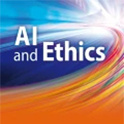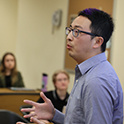
Exploring how artificial intelligence shapes human thinking
Alamir Novin is examining one of the most pressing questions of the digital age: how artificial intelligence shapes the way people think, decide and learn.
The College of Information and Communications has unveiled several groundbreaking initiatives in the field of Artificial Intelligence aimed at advancing individuals and organizations across the state and beyond.
*** Broken component ***

Alamir Novin is examining one of the most pressing questions of the digital age: how artificial intelligence shapes the way people think, decide and learn.

Marcia Purday doesn’t renounce AI, she embraces it. She is using her love of technology to teach generative artificial intelligence skills to students and small businesses.

Ehsan Mohammadi conducted a 20-country survey and found that inaccurate information, plagiarism and reduced critical thinking skills are the top concerns of AI use in academia.

Asking why is an integral part of Vanessa Kitzie’s personality. As a 2025 winner of the university’s Garnet Apple Award for Teaching Innovation, Kitzie is putting the question to her students in ways that force them to consider emerging technology from every perspective.

Grow with Google collaboration brings AI training to local small businesses and nonprofits

Assistant professor Alamir Novin conducted a volunteer-based study on user interaction with AI systems and how user bias evolves. Among the 200 participants, he found evidence of four basic types of cognitive bias.

Understanding the biases of AI in computer vision is important due to visual content's role in creating classes and categories that can shape people’s perspectives writes iSchool associate professor Ehsan Mohammadi.

As AI’s rapid evolution and adoption reaches further into advertising, professor Linwan Wu is studying its implications, impact and national public perception.

Over 50 percent of CIC faculty and staff have completed IBM SkillsBuild AI training, a cutting-edge program which equips educators with essential knowledge and skills in artificial intelligence.

As artificial intelligence continues to reshape industries, its impact on creativity has been a hot topic of debate. Sabrina Habib weighs in with her research.

In the information age, where the boundaries between human cognition and artificial intelligence blur, Alamir Novin, iSchool assistant professor delves into an intricate realm - Human-Computer Interaction - which unveils the subtle yet pervasive biases embedded within algorithms governing our digital landscapes.

The CIC associate dean of research is dedicated to investigating consumer reactions to the use of artificial intelligence in advertising and strategic communication.

Drake’s beef with Kendrick Lamar isn’t nearly as important as his tiff with Tupac Shakur’s estate over using the dead rapper’s voice

SJMC professor Shannon Bowen leads a group studying ethics, safety and impact of AI.